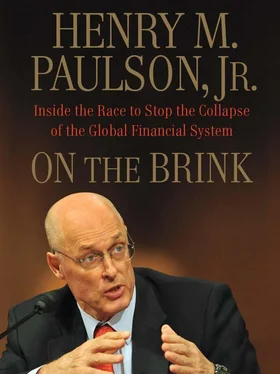I had several discouraging calls with John Mack that weekend. With his firm on the verge of going down, he was under great pressure. But John desperately hoped to avoid selling Morgan Stanley. By this point, he and I both doubted that he could make a deal with the Chinese, although I reassured him I would raise the issue directly with Vice Premier Wang Qishan that evening. John was more optimistic about finding a strategic investor in another Asian giant, Mitsubishi UFJ Financial Group, with whom he had begun talking. But I was skeptical that a Japanese bank could move quickly enough, given Morgan Stanley’s situation.
“You need a solution by the end of this weekend,” I reminded him.
“Hank, do you think I should sell Morgan Stanley?”
“The consequences of a Morgan Stanley failure are so great, John, I believe you should sell if you can.”
During the afternoon I called the White House to update the president. He had been pleased by the market’s rebound on Friday, which he took, along with Thursday’s rally, as a positive sign. But I had to reiterate my concerns for the two investment banks and Wachovia.
He asked whether we thought Morgan Stanley could find a buyer, and I told him that, in fact, we might need to have him talk to China’s president. Any such contact would have to be set up carefully, because the president of the United States should not appear to directly ask the president of China to invest in a U.S. institution. But if it looked like the Chinese wanted to do the deal, we might arrange a conversation. The president would thank Hu for the cooperation of the Chinese in working through the capital market issues with us. That should be enough to indicate how important this matter was to the U.S. Though the president did not commit to the plan right then, he told me to work with National Security Adviser Steve Hadley on it.
Kevin Warsh had begun an effort to get Wachovia to discuss a possible merger with Goldman Sachs, but he was making little progress. The North Carolina bank seemed to lack a sense of urgency. On Saturday afternoon I got involved.
Because he had only recently resigned as undersecretary for domestic finance, Wachovia CEO Bob Steel was not allowed to talk to Treasury on behalf of Wachovia, but I could speak with Wachovia’s directors. I called Aramark CEO Joe Neubauer, who was on Wachovia’s board. I’d worked with Joe and knew him to be financially sophisticated and a straight shooter.
“Joe, I just want to make sure you have the right sense of urgency,” I said. “The Goldman Sachs people are waiting in their offices, and no one has showed up.”
“Why does this have to be done so quickly?” he asked.
“Wachovia is likely to fail soon,” I said. “The market is very nervous about your mortgage portfolio. It’s much better to get ahead of this.”
When Joe called me back later, it was clear that my message had sunk in. I also talked a number of times to Lloyd Blankfein to urge him to be aggressive and creative. I explained, though, that a Goldman-Wachovia deal could not be done if it required too much help from the Fed.
I was at home at about 9:00 p.m. on Saturday night, waiting to speak with my old friend Wang Qishan on the other side of the world, when I needed to squeeze in a call to Montana senator Max Baucus. He wanted to speak with me about TARP and executive compensation. He had come up with an idea to use the tax code to control executive pay for TARP participants by eliminating corporate deductions for compensation above a certain income level.
It wasn’t a bad idea, but frankly I was losing my patience. There I was, trying to save the markets and about to have a difficult conversation with the Chinese, and once again my ear was being chewed off about compensation. “If people are incompetent, I fire them. They don’t get their golden parachutes. I’ve been tough on everyone,” I remember telling Baucus. I said I didn’t see the point in changing the tax laws to penalize the very banks that we wanted to entice into participating in our asset-buying program.
As I would discover in the coming days, the Democratic senator was not about to back down on this idea, which had its merits. Ultimately, we would accept it, but that night I was short with him because I needed to speak with Wang. It was a miracle I was on time for our 9:30 p.m. call.
I’d kept the Chinese vice premier briefed throughout the crisis, and although we were always friendly, on this night we kept pleasantries to a minimum. I talked about the market, and TARP, and my optimism that we would get the powers we needed. Then I brought up Morgan Stanley.
Wang had a high regard for John Mack and his company. As he knew, CIC was looking at increasing its 9.9 percent stake in Morgan Stanley. I said that we would welcome that. But Wang seemed lukewarm and concerned about the safety of any Chinese investment. I knew that CIC had lost heavily on its existing Morgan Stanley holding, and that had been a source of great controversy inside China. I told him that the U.S. government viewed Morgan Stanley as systemically important. But his unenthusiastic tone convinced me to drop the matter—China was already providing tremendous support to the U.S. by buying and holding Treasuries and GSE securities. If a deal for Morgan Stanley had been possible, Wang would have signaled it.
Later I called Steve Hadley at the White House and let him know that I didn’t believe China was going to invest in Morgan Stanley, and that the president’s call to Hu would be unnecessary. And when I got to John the next day and told him that the Chinese didn’t seem to be interested, he wasn’t surprised.
Sunday, September 21, 2008
All the Sunday talk shows had asked for me, and I had four interviews lined up. If there was ever a time to get a clear message out, it was now. Throughout my career I had made a point of answering questions directly. But it was different as a government official. You knew what you were going to be asked, but you had points you wanted to make, and you had to find a way to get them out no matter what questions came your way.
Even though she hadn’t slept much herself on Saturday night, Michele Davis arrived at my house early on Sunday to prep me for my round of interviews. “You don’t have to get your points out all at once,” she said. “You’ll have time to get them out over the course of the interview.” Before I went on Meet the Press , Tom Brokaw said the same thing.
“I’m going to be tough,” he said. “That’s the way you want it—fair but tough. Just remember, Hank, let me come to you.”
At the end of the interview, Brokaw noted that the problems with money market funds had spread to commercial paper and begun to threaten Main Street America. He asked, “The domino effect of this is going to be a no-growth economy, isn’t it?”
“That is why we need these powers. That is why we need Congress to move quickly,” I explained. “It pains me tremendously to have the American taxpayer be put in this position, but it’s better than the alternative.”
That afternoon Ben and I attended a well-intentioned but dysfunctional meeting in Tennessee senator Bob Corker’s offices with several of his fellow GOP senators from the Senate Banking Committee (and a couple more patched in on speakerphone). Corker, a constructive force in the Senate, wanted Ben and me to educate the group, but Jim Bunning hijacked the meeting. I had occasionally locked horns with Bunning, a cantankerous conservative, and this meeting was no exception. The Kentuckian clearly believed that the American people were not worried about our financial institutions or economic collapse. Ben and I both became frustrated with Bunning. The meeting was a complete waste of time for us, when time was more precious than anything.
Читать дальше












